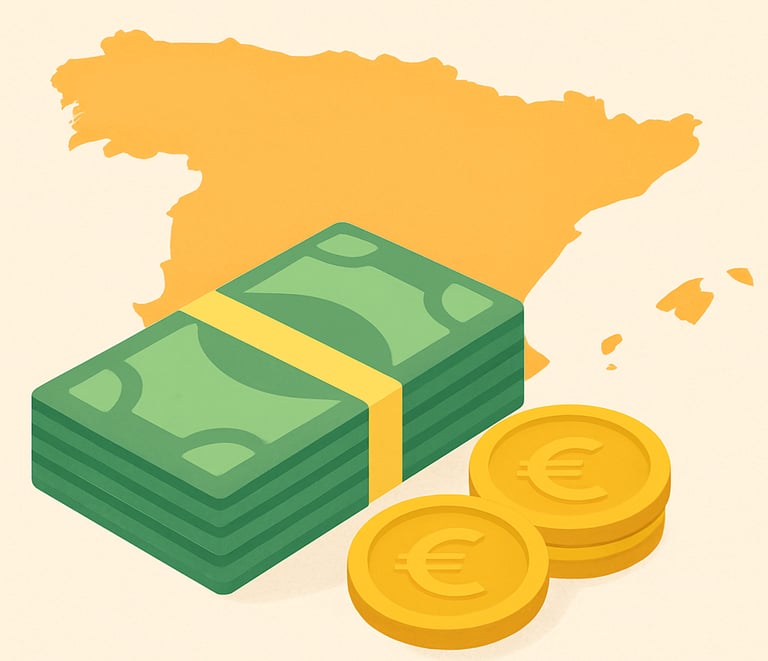Cash Limits in Spain: What You Need to Know
Spain has strict rules on carrying and spending cash, with different limits for residents and visitors. This guide explains the legal thresholds, common misconceptions, and practical realities so you can stay compliant and avoid trouble.
9/25/20253 min read


Understanding Cash Limits in Spain: What You Can and Can’t Do
Cash is still king in many parts of Spain, but there are strict rules about how much you can carry, spend, and use in business transactions. These rules often confuse both residents and foreigners, and rumours sometimes make the situation seem murkier than it really is. Here’s what the law says, what happens in practice, and when you need to be careful.
Carrying Cash: How Much is Allowed?
You are legally allowed to carry up to 10,000 euros in cash when travelling in or out of Spain (or any EU country) without declaring it. Inside Spain, the limit drops to 100,000 euros if you are moving money between cities or regions.
If you exceed those limits, you must declare it to customs or the authorities. Failure to do so could lead to confiscation, fines, and an investigation into the source of funds.
Cash in Transactions: Daily Use Rules
Residents in Spain: The maximum cash payment allowed is 1,000 euros when one party is a professional or business.
Non-residents (tourists and visitors): The limit is higher at 10,000 euros, provided the payer can prove they are not tax resident in Spain.
Between private individuals (no business involved): Cash payments up to 2,500 euros are permitted.
These rules are designed to fight tax evasion and money laundering.
Workarounds and Grey Areas
Some businesses and individuals look for ways around the rules:
Splitting invoices: Technically, this is illegal if the purpose is to avoid cash limits. Authorities see it as one transaction, regardless of how many invoices are issued.
Boutiques and luxury stores: While you may see people paying thousands in cash, the shop usually records the buyer as a non-resident or uses internal tricks to justify the payment. It’s a legal risk, but some retailers quietly take it.
Depositing cash in banks: Banks are required to report suspicious or large deposits. Even if legal, frequent unexplained deposits can trigger questions.
Police Confiscation of Cash
Police and customs officers have the power to confiscate large sums of cash if you cannot immediately prove where it comes from. This is especially common at airports, border crossings, or during roadside checks.
There is no crime in carrying cash itself, but authorities suspect money laundering or tax evasion if you can’t justify the source.
Confiscated funds can be held until you present documents (bank withdrawals, contracts, sales receipts, etc.).
A lawyer can help reclaim the money, but without proof of origin, the process is very difficult.
There have been reports of alleged abuse of these powers, where people feel pressured or treated unfairly, but legally the burden of proof falls on the individual carrying the cash.
Common Misconceptions
“If I split payments or invoices, I’m safe.” False — the law looks at the total transaction, not how you break it up.
“Police can’t take my money unless I’ve committed a crime.” False — they can seize undeclared or suspicious funds on the spot.
“As a tourist, I can pay cash anywhere.” Not entirely true — shops still must follow reporting rules.
When to Be Careful
Carrying more than 10,000 euros across borders without declaring.
Making large purchases in cash as a resident.
Keeping large sums of cash at home and trying to deposit them later.
Accepting “creative solutions” from shops or sellers who suggest splitting invoices.
The Bottom Line
Spain allows cash, but under very strict conditions. The rules are tighter for residents than for tourists, and authorities take compliance seriously. Businesses that bend the rules take risks, and individuals carrying large sums must always be ready to justify their funds.
Practical advice: If you plan to move or spend large amounts of cash, prepare documentation in advance and when in doubt, use bank transfers. It may feel inconvenient, but it saves you from serious legal headaches.
MAE Consulting
Expert guidance for navigating Spanish bureaucracy effortlessly.
© 2025. All rights reserved.


Blog
MAE Consulting is an independent consultancy offering access to vetted professionals. We do not provide legal, tax, or financial advice. All services are delivered through licensed third parties.
CONTACT
SOCIAL CHANNELS
